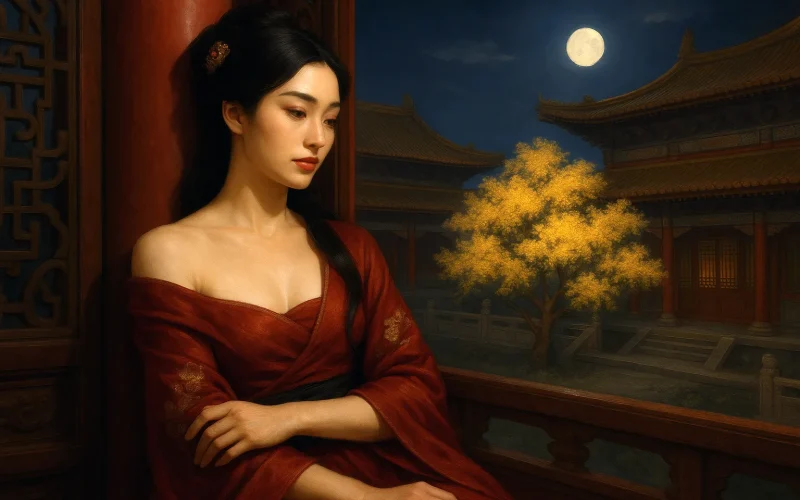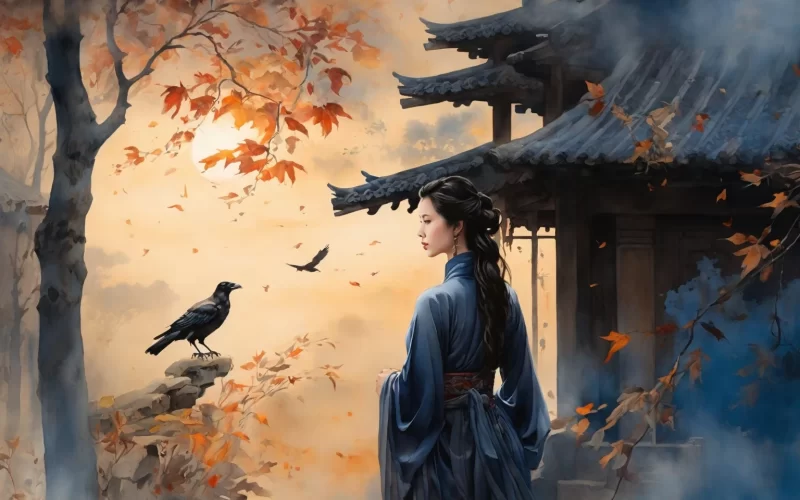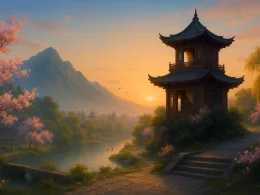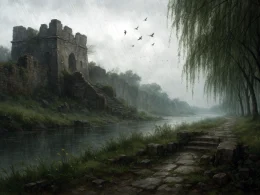In the Cassia Hall, long sorrow forgets the spring;
In the four golden rooms, the dust of autumn rises.
At night, a bright mirror hangs in the blue heavens,
Shining alone upon the woman in the Long Gate Palace.
Original Poem
「长门怨 · 其二」
李白
桂殿长愁不记春,黄金四屋起秋尘。
夜悬明镜青天上,独照长门宫里人。
Interpretation
This poem represents Li Bai's masterful adaptation of the historical anecdote about Empress Chen, consort of Emperor Wu of Han. Initially honored with the promise of a "golden house," she later fell from favor due to jealousy and was confined to Changmen Palace. Rather than merely recounting history, Li Bai uses this archetypal story as a vehicle, employing highly condensed imagery and contrasts to reveal the cruelty of fickle favor and the eternal loneliness of women in the inner court, giving the poem universal significance beyond its specific historical context.
First Couplet: "桂殿长愁不记春,黄金四屋起秋尘。"
Guì diàn cháng chóu bù jì chūn, huángjīn sì wū qǐ qiū chén.
Cassia Hall knows perpetual sorrow, forgetting spring's taste; Its four gold-walled rooms gather autumn dust.
The opening couplet establishes stark past-present contrast. "Cassia Hall" and "gold-walled rooms" symbolize former supreme favor, while "perpetual sorrow" and "autumn dust" deconstruct that glory. "Forgetting spring's taste" profoundly depicts psychological distortion—sorrow's absoluteness has warped temporal perception, leaving only emotional winter. "Gather autumn dust" silently yet powerfully describes environmental decay, symbolizing extinguished favor and spiritual desolation.
Second Couplet: "夜悬明镜青天上,独照长门宫里人。"
Yè xuán míngjìng qīngtiān shàng, dú zhào chángmén gōng lǐ rén.
Night hangs a bright mirror in blue skies, Shining alone on Changmen Palace's dweller.
This couplet elevates the poem with transcendent imagination. Shifting perspective from confined palace to vast skies, the moon like a mirror should impartially illuminate all things. Yet "shining alone" imbues it with cold subjectivity—as a calm observer concentrating all light on this forgotten corner, illuminating her loneliness mercilessly. This isn't companionship but silent judgment, placing personal tragedy on a cosmic scale, deepening its poignancy.
Holistic Appreciation
The poem's artistic achievement lies in its precise, powerful imagery system. "Cassia Hall"/"golden rooms" represent past glory; "sorrow"/"autumn dust" depict present desolation; the "bright mirror" moon serves as eternal witness connecting time and space. In four lines, the poem moves from interior (palace) to exterior (sky), ground (dust) to heaven (moon), creating immense spatial tension and temporal depth within limited scope. Without direct emotional expression, Li Bai uses juxtaposed imagery to let environmental decay and inner despair corroborate each other, coalescing into an lingering tragic atmosphere, showcasing his superb artistry in conveying complexity through simplicity.
Artistic Merits
- Masterful Symbolism and Duality: "Bright mirror" signifies both the moon and historical reflection/cold objectivity; "autumn dust" is both physical residue and metaphorical shadow over past glory and the soul.
- Strategic Imagery Contrast and Resonance: The grandeur of "Cassia Hall" versus the decay of "autumn dust," the vastness of "blue skies" versus the confinement of "Changmen," the universality of "bright mirror" versus the specificity of "shining alone"—multilayered contrasts deepen the theme.
- Deliberate Spatial Architecture: The poem forms a closed circular structure: from ground (palace dust) to sky (moon), then focusing back to ground (palace dweller) via moonlight, perfectly symbolizing inescapable fate.
- Restrained Emotion with Deepening Impact: Without directly mentioning "resentment," phrases like "forgetting spring," "gathering dust," and "shining alone" infuse sorrow between lines, more powerful than explicit lament.
Insights
Transcending individual grievance, this poem reveals the eternal tragedy of dependents in power structures and humanity's profound yearning for dignity and connection. It reminds us that whether in ancient courts or modern society, when one's value entirely depends on another's (or a system's) favor, their fate inevitably faces uncertainty and deep loneliness. Empress Chen's tragedy warns of the importance of maintaining spiritual independence and self-worth. Simultaneously, the "uniquely shining" moon inspires us to compassionately notice and illuminate those forgotten by mainstream narratives. On a broader level, it provokes eternal reflection on power, dignity, and human alienation.
About the poet

Li Bai (李白), 701 - 762 A.D., whose ancestral home was in Gansu, was preceded by Li Guang, a general of the Han Dynasty. Tang poetry is one of the brightest constellations in the history of Chinese literature, and one of the brightest stars is Li Bai.












